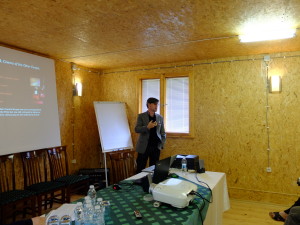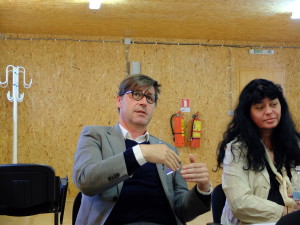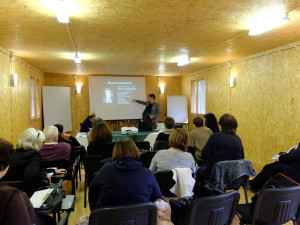Lars is Danish – lives and works in Sweden (University of Skövde, where
he teaches moving image theory to game developers). Went to university in Scotland where he was the scholar of the Bulgarian Dina Iordanova. His research focuses on transnational and postcolonial filmmaking in Eastern European cinema and his current research topics include Albanian cinema, bicycle cinema and the intersection between computer games, film and fine art.
He arrived in Bulgaria as a participant in the International Conference
RETHINKING 20TH CENTURY ARTS HISTORY which took place in the small village of Mala Tsurkva (close to Samokov), Bulgaria on 26 and 27 June, 2015. His paper`s title was: ,,Postcommunist cinema: industry, history and the philosophy of art“
Post communist cinema. Isn`t it a bit dangerous to unite all these cinematographies under one term?
Yes, it is dangerous. You can flatten all the differences and say that they are sort of more alike but this is not my point. We need to investigate what has changed in the transition from communist production to capitalist one. We need to identify these changes and see how the industry deals with them. I am aware that it could be dangerous to hold this whole region together and it is problematic at times, but we need to do it in order to understand how cinema can work differently.
What is the visual and aesthetical side of the problem? In your paper you
stated that post communist cinema could be found in different areas of the world even Hollywood. What do you mean by that?
It`s not that hard to grasp actually. Not for me, anyway. Hollywood can be affected by the fall of communism even visually. If you look at Cohen brothers – they are a good example of filmmakers who are trying to reflect on what the world looks like in a sense. Their filmmaking is directly influenced by the disappearance of the Cold War dynamics. Look at ,,The Big Lebowski’’ (1998) – it could be seen as interrogating what does it mean when the Soviet union collapses and there`s only USA left. The character played by Jeff Bridges is this `68 person who`s a bit failure now but he has his history of being a person who did something significant.
Hollywood has also focused on migrating people. So you can see the real effect on portraying the Russian mafia, prostitution or migration labors. The big villain in American film had to be someone else. Inventing a new villain is an old trick but it is a real effect of the post communist situation.
So you could say that dramaturgically Hollywood had to invent a new villain.
Yes. But I am not saying that post communism is so much affecting how we make film but why we make film. The technique of filmmaking stays the same but it`s the topic and the context that changes.
In your studies you mention the impact on Africa as well.
Exactly. And this is the real sort of effect from the fall of the Soviet Union. During the Cold War, it was possible for a Serbian or Russian filmmaker to go and help an African nation to establish a film industry, because these nations were dependent of the support from the communist bloc. This obviously dies away with the fall of communism. Also a lot of African filmmakers took the opportunity to study film in Moscow and now we witness the result with the success of Abderrahmane Sissako (director of ,,Timbuktu’’, 2014) who is making the most important films in the region. Sissako was educated in the Soviet Union at VGIK.
NATO placed troops in Bulgaria as an answer to the Ukraine crisis and this provoked a great discussion. How do you think that Russian cinema will reflect on all these actual events in the future?
It is a very difficult question. Russian cinema is divided to independent cinema and an established film industry, which is getting support from the government and has the same political point as the government. So it would be very surprising if we see something from the establishment that goes against what is the general line of the government. And they are very clear about it. You can make critical films but you won`t be supported by the national film fund. So there is still censorship in that sense. Economic systems are ruling what you`re doing. But I think that something interesting would come out from the independent cinema because there are Russian filmmakers who are in opposition to the national discourse that is being promoted by Vladimir Putin and his cronies. And there are good films coming out of Russia.
I was doing a panel at a film festival, which was before the conflict, and it showed that there are things happening in Russia at a lower scale. I think they are going to keep on making blockbuster films that they can sell to the Russian masses, but they won`t be of interest to us actually.
We still witnessed ,,Leviathan’’ (2014, dir. Andrey Zvyagintsev) that was
supported by the government and was critical. So it may be a kind of a think they had before with controlled dissidents.
Exactly. But it`s dangerous because being popular abroad means being anti-establishment. I`ve seen some people debating on TV whether they should support the government in the war effort to “protect Russian interest in Ukraine” or not. Such debates divide filmmakers and create an atmosphere where there is a strong fear of speaking out against the regime, because ultimately, funding system can hurt your filmmaking career.
You are a scholar of Dina Iordanova. So you should have a kind of sensitivity for our region. What position Bulgaria has in the context of your paper/studies?
I think Bulgaria`s in a good position. It can be the next country to hit the New wave button in a sense, but it has to compete with other national cinemas for that. Talking about New waves, you usually have one person or a group of people that are strong representatives of the movement. In Denmark it was the success of Lars von Trier that helped promoting Danish films, but he also promoted his Danish colleagues to international audiences. The worst think you can have is one goes up and criticize all the other guys instead of helping other filmmakers get promoted as well.
Usually in Bulgaria when one goes up he is being criticized by the others but I think this tendencies are slowly dying. Unfortunately we are still lacking this strong person or a group. Hopefully we shall have that as well.
You teach moving image theories to game developers. In the context of Hollywood this is not so strange but how the more conservative European cinematographies deal with that?
It is becoming more and more obvious that game has changed film and film has changed game. They are not separate completely. They are making films more game like in visual sense. And film impacts on game dramaturgically. Games become more immersive and storytelling. They are also dealing with cinematic genres like noir, horror etc.
There is a fundamental difference between them and obviously it`s the interactivity of game that film has on a different level. The new audiences are engaged in gaming so film has to address that in order to capture them.
On the other hand game industry are looking for strong minded people who can make a good game and can actually tell a story as well. The thinking about film and game is changing. Any conservative cultural industry would die if it doesn`t renew itself. So my job as a film scholar is to teach my students the history of cinema and how storytelling in film has evolved over time, in order for them to become better game developers. And the most important I teach them is the cinema they don`t know. I teach New wave, 20`s avant-garde, independent cinema etc. because they already know what Hollywood is, they already know what blockbuster filmmaking is. Viewing these other cinemas, they realize that mainstream is not the only way and that a game doesn`t have to necessarily be a first person shooter or a fantasy. It is about expanding their field of vision. My hope is that through my students the game industry is changing and developing into something new and exciting.
It is interesting how the older media brings freshness to a new one. You work and live in Sweden which is the birthplace of The Pirate bay and The Pirate party. Let`s talk about that.
One of the reasons The Pirate bay became such a big thing is obviously because it came out of Sweden. Sweden is a country that has an aura of finding new paths – of not only innovation of technology but also a safe haeven for freedom of thoughts. The whole idea of the internet had a strong sense of freedom within it, but I think Edward Snowden has changed all that now. The material he`s been able to produce and release – the evidence of this kind of mass surveillance has changed this mood of optimism, which also characterized Тhe Pirate Bay and the political party that followed. People are not so confident now in internet as a place for freedom. Now there`s a more dual view on it. It can do good but it can certainly also do evil stuff.
You gain freedom and you lose freedom in the same time.
Exactly. And I was thinking about your project on film criticism. It`s very important because it is a field that is also changing because of the arrival of the internet.
Yes, I always ask this question about the future place and state of cinema critics, history and theory. How do you feel about it?
It is interesting that you mentioned theory because normally we don`t think of critics as theoreticians but actually the French critical tradition has always been about theory and finding the origin of their medium. Critics became filmmaker and filmmaker were per definition also film critics. As for criticism generally, then it has moved to the internet and now we don`t trust the critics as much as before. It is less prestigious profession and that`s what makes us less confident in it.
As there`s no money in this profession you have to really enjoy it. It is like being an artist as there`s no money in art in a sense. You have to like writing about film and communicating to a public about a topic you like. Even if you don`t like the film you have to write quality critique. Even if the profession is dropping down it doesn`t mean it`s going to disappear because we will always need criticism. In the context of internet where we get access to everything it gets even more important to have an editorial hand in programming something for us. A structural way of digesting a large body of films such as the film festival does. It provides us with a guideline, which we can choose or choose to ignore. This is where film criticism still has a role to play.
What`s the situation with film press in Denmark and Sweden?
The publishing houses are having a difficult time because nobody wants to buy magazines anymore. It is still expensive to make hard copies so some journals just moved only to digital production. However, there is this trend in Sweden where the most specialized magazines were actually doing the best economical success. Big national newspapers were not doing very well economically but these specialized hobby magazines are still being produced and economically viable as well. I think as academics we are at time killing the profession of the film critic since we too easily venture into writing critical reviews. But we are writing our articles for free because we have to in according to our employers` wishes. We have to show our research results. So we are also contributing to the downfall of independent critics which is sad.
This conversation is arranged with the support of prof. Alexander Yanakiev and is published in his loving memory.
Pictures + text: Rosen Spasov






